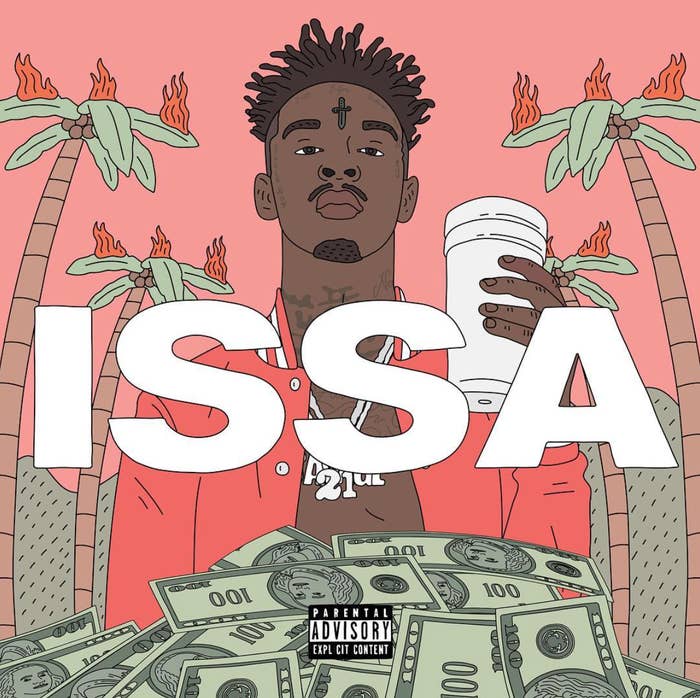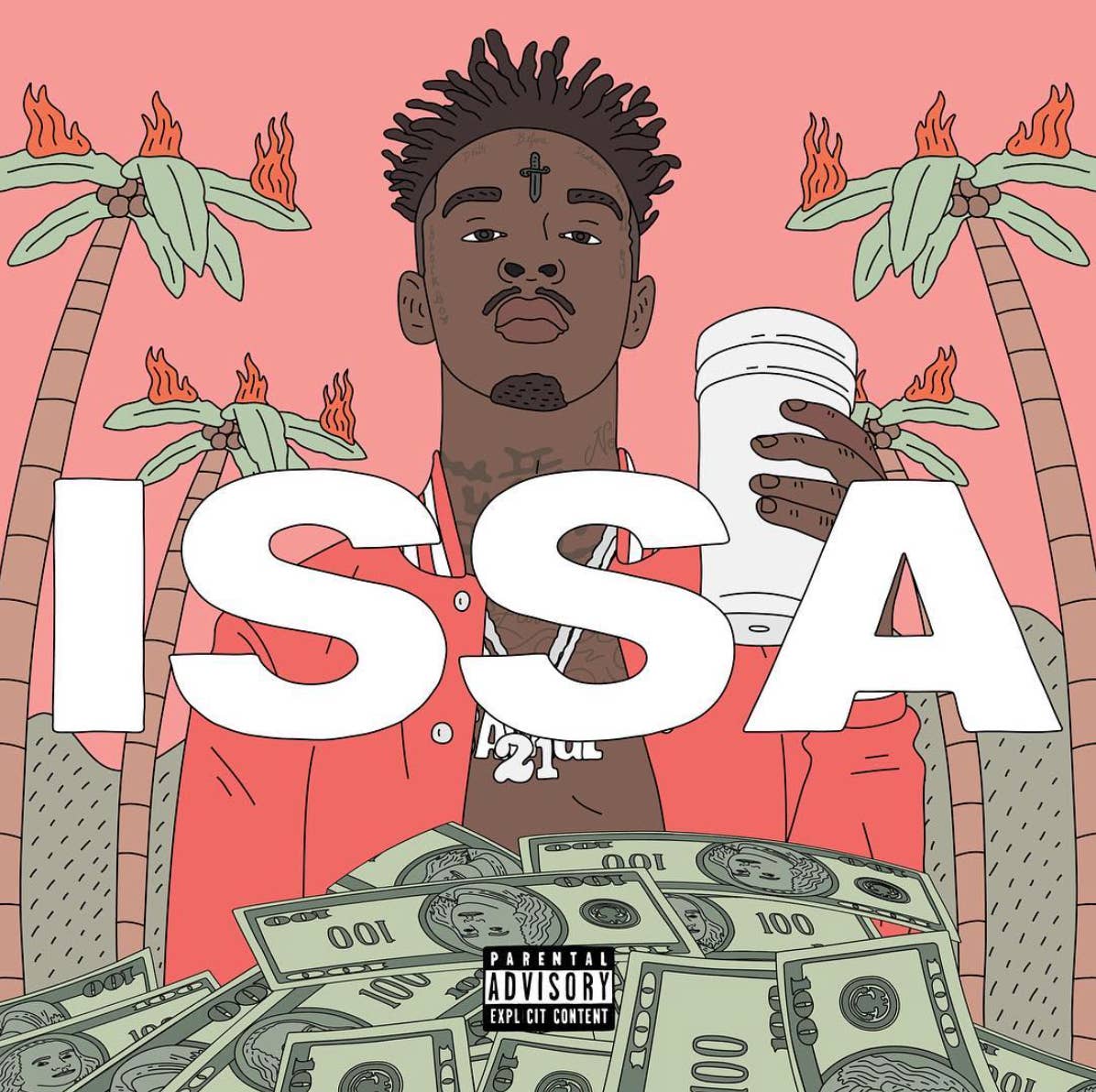
“It was a hard year for music. It was hard for anybody to sell music. Music was so hard to sell this year that they had to sell it without even mentioning the music. When the 50 Cent album came out, I never heard a damn thing about the music. All I kept hearing was: ‘He got shot nine times!’ Who produced it? ‘He got shot nine times!’ Who all’s on it? ‘He got shot nine times!’”
— Chris Rock hosting the 2003 MTV Video Music Awards
The details of 21 Savage’s life are almost too grisly to recount. He has three names tattooed on his stomach: Tamika and Larry are a mother and son, killed at the same time. Johnny is one of 21’s closest friends who, on 21’s 21st birthday, was behind the wheel of a car when he got fatally shot in the head. 21 was in the passenger’s seat, and was hit with six bullets. He survived, obviously. (He would later tell the Fader that despite “a whole lot of blood loss” he didn’t feel much, because of the adrenaline.) And that more famous bit of ink—the dagger where his third eye would be—is an ode to his younger brother, Quantivayus, one of eleven children in the household. The brothers had agreed to get the tattoo on their hands, but Tayman, as he was called, one-upped all his siblings and bore it into his forehead. He, too, was shot and killed.
Those are merely the losses grafted onto his skin. The rapper, who was born Shayaa Bin Abraham-Joseph on the tiny island nation of Dominica, on the Eastern edge of the Caribbean Sea, grew up in a string of apartments around Atlanta. He populates his music with ghoulish figures and garish scenes of violence, usually—at least since he found a voice and refined a style—as an opportunity for him to differentiate himself as the cool, unfazed bystander (or perpetrator, as the case may be).
These are not, as cynical observers might argue, invented bits of branding; they also don’t draw their power from veracity alone. The idea that 21 Savage’s music works because it’s an unfiltered true-crime purge is absurd, and ignores the careful aesthetic decisions he’s been tinkering with since he debuted. On Issa Album, his first album for Epic, 21 broadens his focus with a record that is at turns brash and thoughtful, pop and serrated, and reveals himself as a dynamic vocalist.
Those who came to 21’s music either this year or last would be surprised to hear his earliest recordings, where his voice came in at a much higher register and conveyed things he’s mostly left behind: excitement, boisterousness, nerves. The Slaughter Tape, from early 2015, garnered some attention and even scored a minor hit in “Picky,” but saw 21 feeling around for a style, talented but failing to distinguish himself from his Atlanta peers. “Heart So Cold,” for example, could have been ripped from one of Future’s pre-Pluto tapes, or from the second I Came From Nothing. The wit and economy of language that would come through more clearly on later releases poked through now and then: “Bitch I’m 21 Savage, all my cases get dismissed.” But the song that line is from, “FNB,” could have been from Kevin Gates’ formative period, and is mostly unmemorable.
Things changed rapidly. An EP, Free Guwop, and a mixtape, Slaughter King, followed in quick succession, both before the end of 2015. (As with nearly everyone from this generation in Georgia, 21’s DNA contains healthy doses of Gucci Mane.) Slaughter King especially showed 21 nibbling around the edges of his eventual style; “Mind Yo Business” in particular feels fully formed, with its carefully written runs like “Bullet holes in my body/Paranoid I’ma pop it/If you snitchin’ I’ma pop it, wrong move, I’ma drop ‘em/.15 in my socks, trappin’ at the bus stop/Came from a nickel rock/Now I got a hole block.”
Another standout from that tape was the Metro Boomin-produced “Deserve.” Metro was an early supporter, lacing 21 with beats when he had scarcely rapped a word into a microphone. Their full-length collaboration, last year’s star-making Savage Mode, is one of the most gripping rap records from this decade. To be fair, a bulk—maybe the majority—of the credit goes to Metro, whose beats play with tempo in ways that push the outer boundaries of rap, and which frequently stray into ambient territory. But it was also 21’s most impressive performance, by leaps and bounds over his older work. He finally rappelled down to his current vocal register, and on the record’s front half is a world class rapper: “No Heart” is arresting, no-frills biography, and the opener “No Advance” sounds as if 21 is summoning Metro’s drums with each stilted, syncopated phrase, like a heart made to beat manually.
While the new record credits a litany of heavy hitters (Metro, Zaytoven, Southside, DJ Mustard, even Jake One), the onus is now on 21 to fit the pieces into a whole, and for the most part he succeeds. Issa Album is overly long, probably by ten or even fifteen minutes, but with that breathing room touches on more moods and points of view. “Thug Life” transposes Savage Mode’s general ethos to a beachfront resort, the Mustard-helmed “FaceTime” makes More Life looser, more fun, and funnier, and “Special,” despite being a prime candidate for final trims, is an interesting glimpse at what 21 might have written if he sat in on the Honest sessions.
21’s default mode is still a disarming slow flow, laconic in a way that implies tension and takes care with each syllable. (While ‘mumble rap’ is a pejorative term applied to rappers who are usually not mumbling, 21 is the strawman’s opposite: he has moments where his diction is so clear you could use it to teach English.) When he’s at his most deliberate, he’s also at his best. See “Numb,” where the droning repetition of “Numb the pain with the money” is not assigned any moral or spiritual value, but is rather, quite literally, a matter of course.
There’s a numbing effect to psychic, physical, and spiritual pain; this is obvious with the more bludgeoning strains of trap music, but there’s a control in 21’s music that’s frank, and often chilling. “Close My Eyes” details an inescapable trauma loop with the resignation of someone who’s given up hope of relief and is merely trying to adjust. “Nothin New” opens: “They thought I only rapped about murder and pistols/I’m trying to feed my family—I ain’t being political.” That song’s second verse, though, starts “Shit getting outrageous/They treat us like slaves then lock us in cages” then goes on: “I used to sell dope, nigga, now I can’t vote/Popping Percocets to kill the pain, I can’t cope/Anger in my genes/They used to hang us up with ropes/Civil rights came, so they flood the hood with coke.” There’s then a reference to Martin Luther King’s assassination, and on another song a promise that if he was Rosa Parks, he would have “shot that cracker.” When Chuck D compared hip-hop to the nightly news, Walter Cronkite was mostly disseminating facts; 21 Savage is adapted to the cable news era, where reportage and entertainment and snarled analysis is all rendered in surround sound and widescreen, loudly and interminably.
On Issa Album’s first song, 21 raps: “The internet ain’t gon’ help you understand me.” This is true, even when (as with the album title, itself a reference to a popular meme) he’s pulling the levers to attract clicks. The popular image of 21 Savage is reductive, and saddled with the obvious baggage of race and class that follows the gawkish voyeurs who latch onto popular street rappers. His music can be deeply grim, of course, but it can also be sneakily clever or laugh-out-loud funny: see the line about the “Right Thurr” video on “Bank Account.”
The jarring thing is that the idea of 21 and his identity has been made uncomfortably flat. Consider that he’s not given the same against-all-odds origin myth that 50 Cent was for a similar shooting; consider that someone who’s improved, on an aesthetic level, with remarkable speed and clarity is still reviewed as an unrefined pulp artist. His quip, on Savage Mode, that he prays to his Glock is taken at face value and not cross-referenced with his Ifa practice. He is not given the benefit of narrative, a sense that he’s overcome unfathomable loss to achieve creative and commercial success. Issa Album argues for 21 as an artist well-rounded enough to be a genuine star without straying too far from his creative center. But, you know, music is hard to sell.

